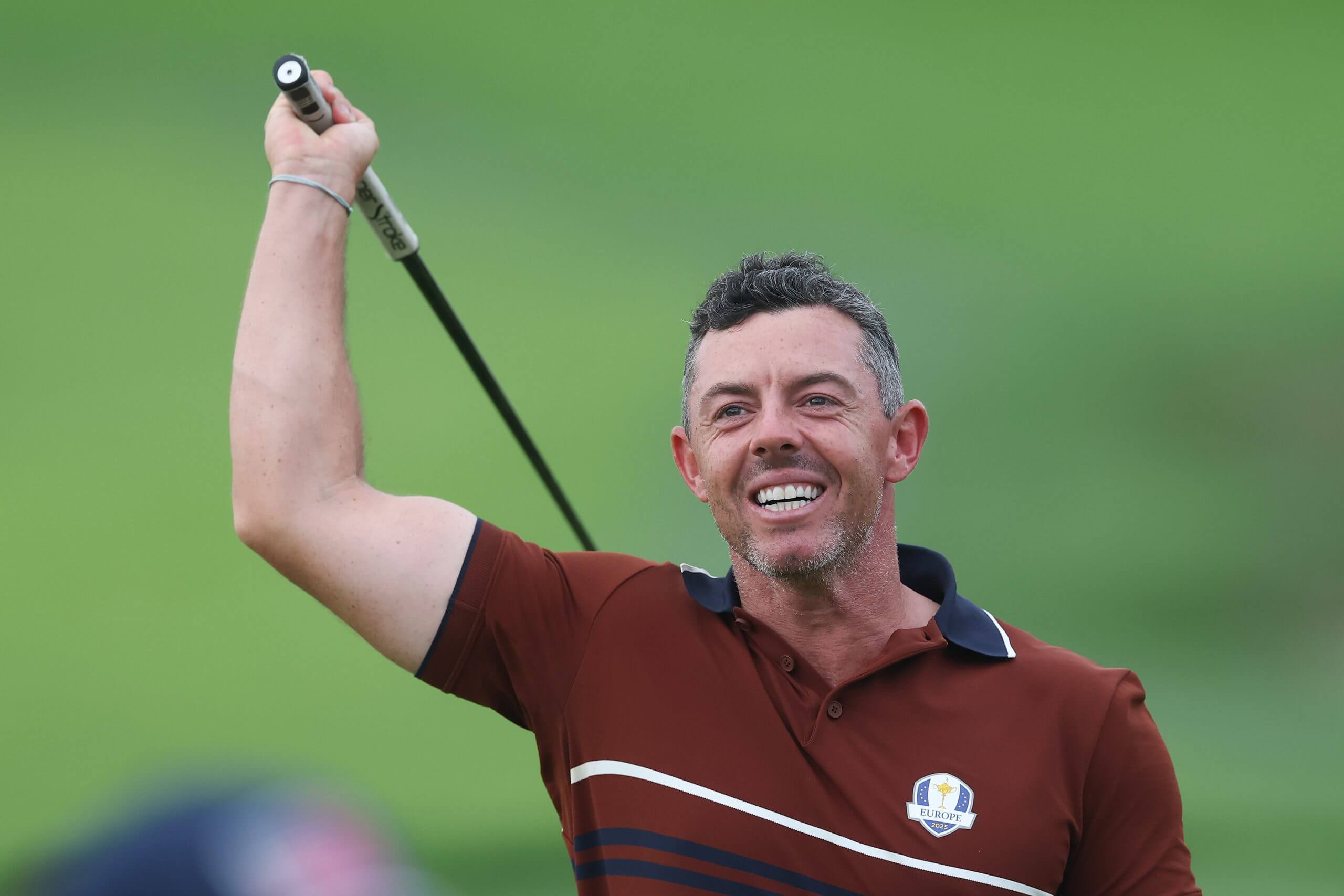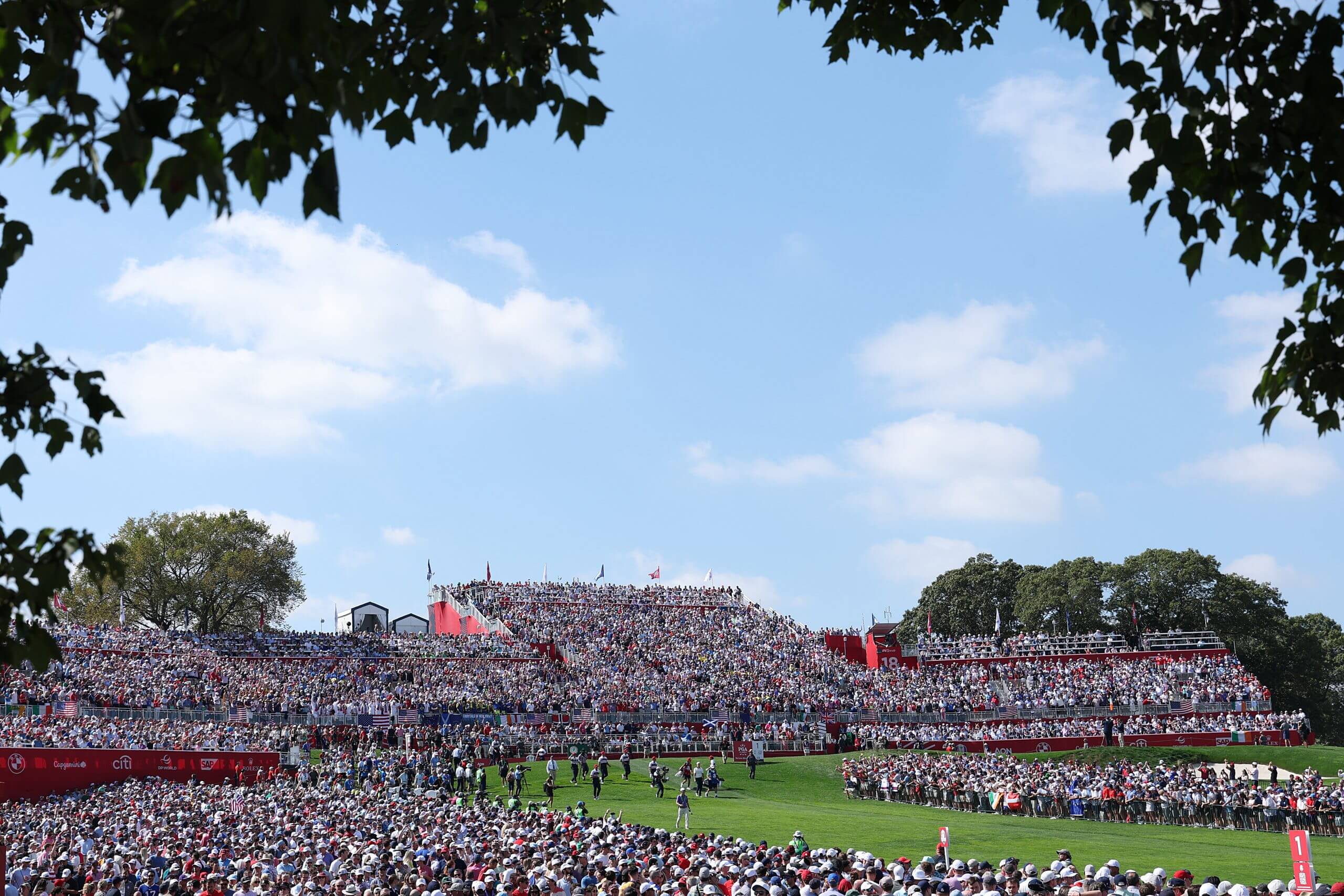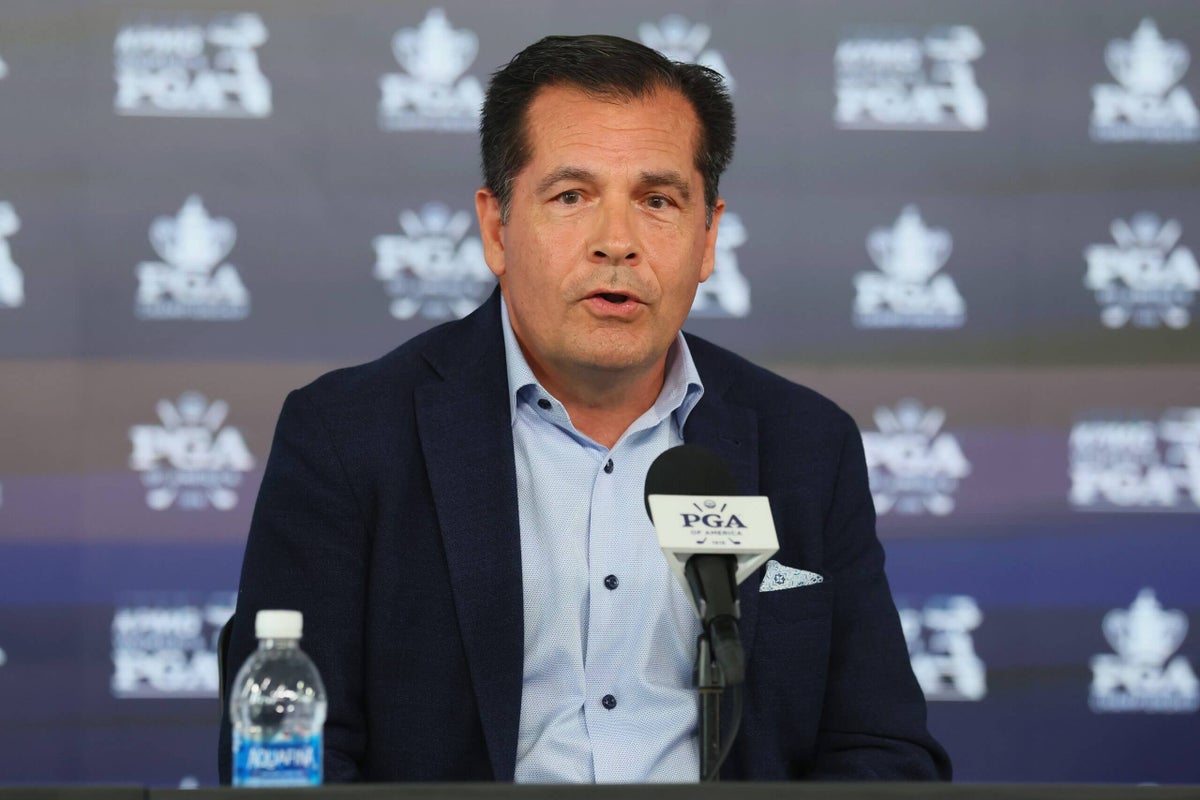Derek Sprague was standing on the first tee box Saturday morning with other members of PGA of America leadership when Ryder Cup emcee Heather McMahan took the megaphone and promoted the chant, “F— you, Rory.”
The PGA of America CEO and fellow senior staffers immediately agreed: “She’s done.” By Saturday evening, the PGA of America released a statement that the comedian apologized to Rory McIlroy and stepped down from her emcee role.
It was not the last apology necessary — the days following the Ryder Cup at Bethpage Black have been filled with regret, debate and discussion about the role of fan behavior in Ryder Cups going forward after the European team suffered a steady stream of abuse last week on Long Island.
The primary target of that abuse was McIlroy, the golfing superstar and face of the European team.
McIlroy won both of his matches Saturday while hearing lewd insults about his personal life, homophobic slurs and a steady stream of expletives during his backswing. His wife, Erica, also had a drink land on her.
The tensions rose enough that McIlroy and playing partner Shane Lowry eventually returned the expletives right back.
It did not help the PGA of America’s case that its president, Don Rea, told BBC Sport on Monday that “Things like that are going to happen.” Rea said you can go to a youth soccer game and hear people yelling the wrong things, and when pressed on McIlroy’s specific abuse, he said, “I haven’t heard some of that. I’m sure it’s happened. It happened when we were in Rome on the other side, and Rory understands.”
Sprague, who took over as CEO in January, took a far more aggressive stance in an exclusive interview with The Athletic on Wednesday, condemning the behavior of those fans at Bethpage. Sprague said he had a lengthy phone call with McIlroy’s manager, Sean O’Flaherty, on Wednesday morning, in which he apologized and asked O’Flaherty to share a letter with the McIlroys.
“I sent a long email to share with Rory and Erica and just told him that we will do better in the future,” Sprague said. “I’m the CEO now. I don’t condone this type of behavior. This is not good for the game of golf. It’s not good for the Ryder Cup. It’s not good for any of the professional athletes, and we will do better.”
Sprague said he’s known Erica since her time working with the PGA of America last decade.

PGA of America leadership apologized to Rory McIlroy for what he endured during the Ryder Cup. (Carl Recine / Getty Images)
Rea’s comments were not well received by the European team. “I saw the interview with the PGA guy discussing about it was the same in Rome. It’s pretty offensive to European fans the fact that he said that, really,” Euro team member Matt Fitzpatrick told reporters.
This was Sprague’s first Ryder Cup as CEO. He’s previously been the PGA president and spent the last few years as TPC Sawgrass’ general manager.
This was supposed to be his big week. Instead, he’s doing damage control on a week that became about everything other than golf.
“I’m disappointed in fan behavior, disappointed in the first tee and the emcee that it’s just that’s not who we are,” Sprague said. “And I was just really, really, really disappointed.”
In an email obtained by The Athletic, Rea told the PGA of America’s 30,000 members on Thursday afternoon, “Some fan behavior clearly crossed the line. It was disrespectful, inappropriate, and not representative of who we are as the PGA of America or as PGA of America Golf Professionals. We condemn that behavior unequivocally. What makes our sport great is that we own our bogeys. We certainly own this one.”
Sprague admitted mixed emotions for the entire week. The PGA of America fully expected logistical challenges — “Anybody who has been in New York City and Long Island with millions of people trying to get on the road knows there are going to be delays. But that came to fruition,” Sprague said. But he was pleased with the way security and logistics handled the appearance of President Donald Trump on Friday.
Surprisingly, the bigger issue Friday was the lack of energy.
“We’ve been waiting 12 years for that first tee shot on Friday morning of the Ryder Cup, and I think the first tee experience was a little underwhelming at the outset,” Sprague said. “I don’t know if it was the stands itself where it was less of a coliseum and you don’t get the echoes.”
It was difficult because he thought the decision to make an expanded grandstand that stretched from the 18th green to the first tee worked well and gave the former an exciting feel at the end of matches. But fans flooded the arena at 5 a.m., and by 7 a.m., as the first tee times were about to begin, the energy was flat. Music blared for most of the morning until about 30 minutes before the opening shot.
“I think the music was appropriate at a certain point,” Sprague said, “but my best memories from the Ryder Cup are the organic chants from European teams and the American team.” He and his team will evaluate better pregame plans for the future, as he sees the need for entertainment during the wait time but doesn’t want to lose the natural energy. “I’m not sure the emcee was additive,” he said.

While thousands gathered around the first tee many felt the energy was lacking. (Jamie Squire / Getty Images)
Saturday, it flipped. The tenor of the crowd changed from lackluster to downright aggressive — weight comments to slurs to expletive-filled rants about players and their wives. Sprague was quick to point out that those bad actors were the extremely small minority, even if there’s still no place for it.
He said the PGA of America and the DP World Tour worked together with security, state police and private agencies to put plans in place for managing the fans and ensuring players and their wives were well protected inside the ropes.
From the moment it was announced the Ryder Cup would come to New York, many expected a raucous crowd that could rival the 1999 Brookline crowd in Massachusetts for the most hostile toward Europeans. Even if it was initially underwhelming, why did the crowd eventually cross the line, then?
“I think a lot of it was the anticipation of coming to New York,” Sprague said. “We know this market has so many sports teams and passionate fans. We knew they would bring that passion to the Ryder Cup, and that’s why we were aware of it and working with the security team to make sure that it was managed as best as possible.”
One challenge in preparation is nailing down what actually crosses the line. Banter and even chirping the opposition is not an issue at Ryder Cups. It’s generally encouraged from both sides. Messing with players during their swing and lobbing personal attacks are where McIlroy, Lowry, Matt Fitzpatrick and others have voiced displeasure.
“It’s hard to define what crosses the line, right?” Sprague said. “You almost have to be there, and when we were getting reports of those incidents, the security — state police or private or whoever — we were dealing with those as they came up. We threw out a number of people, or we moved people to other places away from the matches if they were heckling certain players of that match.”
Next, the Ryder Cup goes to Ireland’s Adare Manor in 2027, when once again McIlroy, a Northern Irishman, will surely be a main character. In the moments after Europe’s victory, McIlroy said he plans on making clear to European fans that what happened at Bethpage was not acceptable and shouldn’t go the other way. He and Sprague agree that the focus should be on cheering for a team, not against another.
“Look, I don’t think we should ever accept that in golf,” McIlroy said Sunday. “I think golf should be held to a higher standard than what was seen out there this week. Golf has the ability to unite people. Golf teaches you very good life lessons. It teaches you etiquette. It teaches you how to play by the rules. It teaches you how to respect people.”
Sprague said the PGA of America and the DP World Tour will do a debrief in the coming weeks to discuss Bethpage and how to improve conditions for Ireland. Within that, there will be a focus on messaging.
“We will make sure that we focus on what the Ryder Cup is all about,” Sprague said. “It’s about decorum and sportsmanship and integrity. The game has the highest values in all of sports, and we need to sort of have a guiding light to focus on from both sides of every match.”
(Top photo of Derek Sprague: Bruce Bennett / Getty Images)

